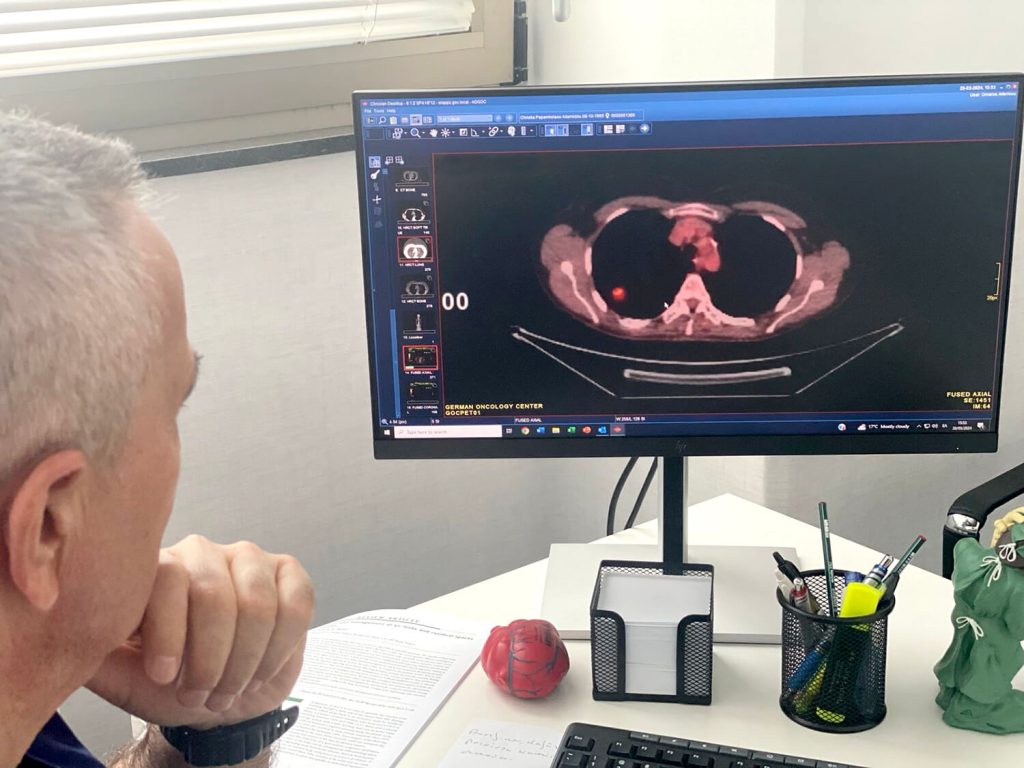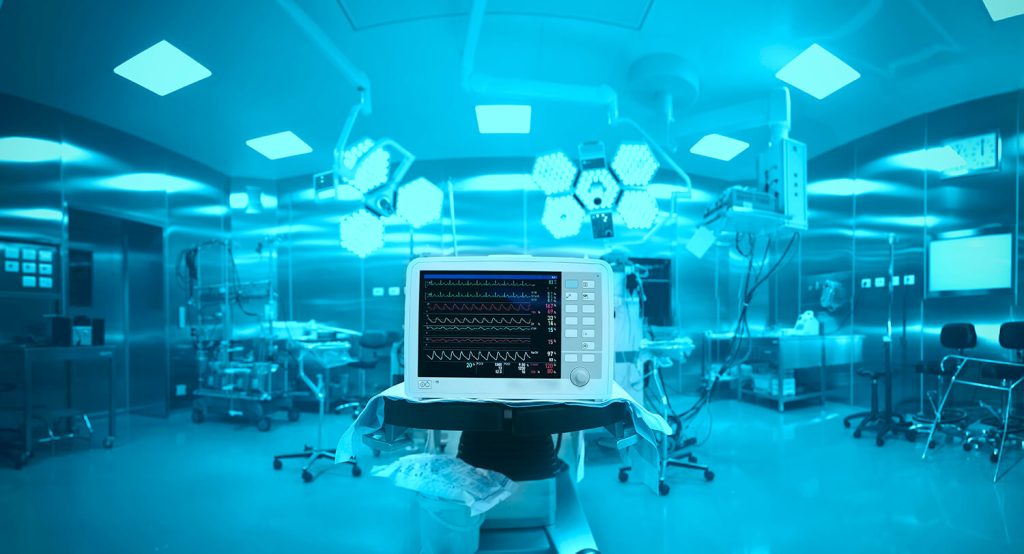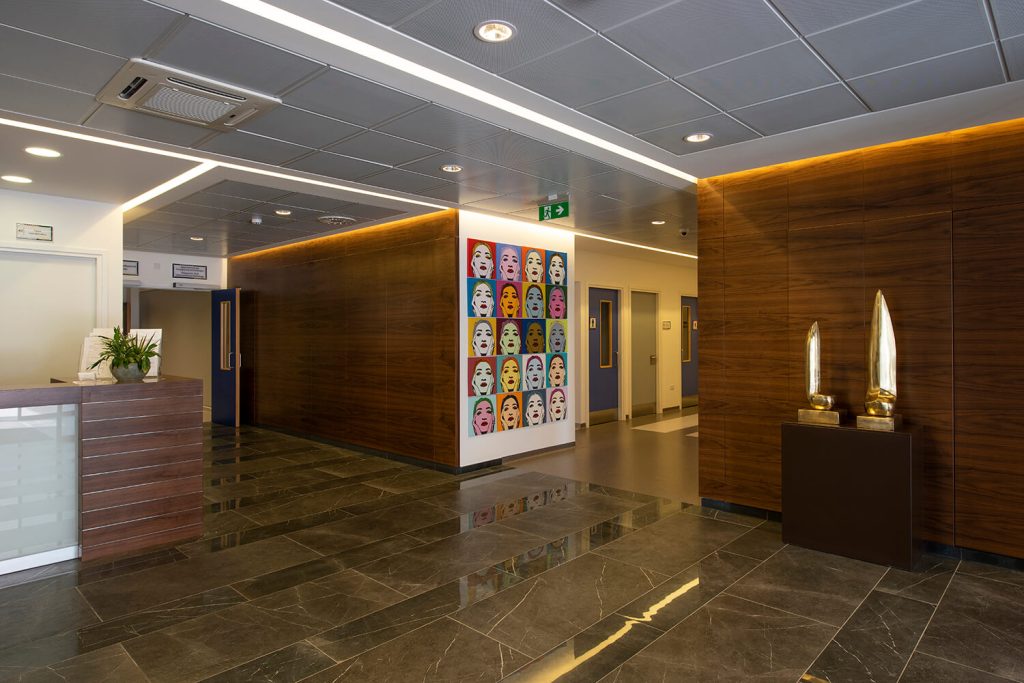General Thoracic Surgery
“Ην γαρ παρή φιλανθρωπίη πάρεστι και φιλοτεχνίη”
Ιπποκράτης 470 – 370 π.χ.
“Wherever the art of medicine is loved, there is also a love of humanity”
Hippocrates 470 – 370 b.c.
About
Welcome to the Department of General Thoracic Surgery.
General Thoracic Surgery specializes in the diagnosis and treatment of a wide range of benign and malignant conditions of the lung, mediastinum and chest wall.
The department offers the complete spectrum of surgical treatment, from minimal invasive to maximal radical surgery such as:
- Uniportal Video Assisted Thoracic Surgery (VATS)
- Muscle sparring mini-thoracotomy/thoracotomy
- Sleeve resections
- Complex resections
- Thoracic wall resections
The main focus is the surgery of all different types of thoracic malignancies.
LUNG CANCER
Lung cancer is the leading cause of cancer-related death, both in men and women, worldwide.
In early-stage disease, primary radical resection, together with systematic lymph node dissection, is the preferred approach to achieve curative treatment. In locally advanced lung cancer, surgery is usually combined with preoperative cancer treatment such as chemo-, immune-, or targeted treatment and radiotherapy in selected cases. The introduction of immune- and targeted therapy has improved the overall outcome significantly.
THYMIC TUMORS
Thymic malignancies are rare mediastinal tumors. In an early stage of the disease, with a well-defined tumor without involvement of adjacent mediastinal organs, primary radical surgery is the treatment of choice.
In more advanced stages, multimodality treatment approaches including systemic treatment, radiotherapy and surgery have been proven to provide good long term outcome in selected patients.
CHEST WALL SARCOMAS
Chest wall sarcomas are divided into bone and soft tissue sarcomas and include a heterogenous group of malignancies such as chondrosarcoma, osteosarcoma, Ewing sarcoma, liposarcoma.
Biopsy, for histological confirmation, is required to plan the multimodality treatment approach. Radical resection of the chest wall, with reconstruction of the resulting defect by prosthetic materials and/or muscle flaps, remains the state-of-the-art treatment.
LUNG METASTASIS
The lungs are the second most common site of distant metastasis from extrapulmonary malignant tumors, mainly colorectal cancer, kidney cancer, soft tissue sarcoma, osteosarcoma.
The combination of systemic treatment with surgical resection leads to prolonged survival or even cure in carefully selected patients.
Surgical technique, open or minimal-invasive (VATS), depends on the number, size, and location of the lung metastases. Bilateral metastasectomy, as well as remetastasectomy for recurrent disease are equally important treatment options.
PLEURAL MESOTHELIOMA
Malignant pleural mesothelioma (MPM) is a rare but aggressive malignancy arising from the surface of the lung and the inner surface of the chest wall (pleura), mostly related to exposure to asbestos.
Treatment strategies include the combination of chemotherapy, radical surgery, and radiation. Depending on the case, the surgical techniques are (Extended) Pleurectomy/Decortication or Extrapleural Pneumonectomy.
Other, more recently explored locoregional therapy approaches include hyperthermic intraoperative chemotherapy, as well as photodynamic therapy and a combination of multimodality treatment with immunotherapy.
ESOPHAGEAL CANCER
The main symptom of esophageal cancer is dysphagia due to obstruction of the esophageal lumen.
Curative treatment concepts are most often embedded in a multimodal concept, not only involving surgery, but also neoadjuvant or adjuvant chemo-radiation therapy. Surgical techniques include mainly resection of the esophagus and replacement with stomach or part of the large bowel. Both aim to offer radical resection combined with restoration of deglutition.

The Team
Dr. Omeros Artemiou, Director of the Department, together with his team, consisting of a group of highly skilled surgeons, anaesthesiologists, nurses, and healthcare professionals, and in close cooperation with all major partner departments within the German Medical Institute as well as international departments, guarantee treatment at the highest level and provide access to the most appropriate techniques.
In addition to our clinical expertise, we prioritize patient education and support throughout the treatment process. Always with empathy, enthusiasm, and determination, we are committed to provide personalized care for each patient, from the initial consultation to post-operative recovery for the best possible outcome.

Amenities
The German Medical Institute, equipped with the latest technology, is a state-of-the-art facility offering the perfect infrastructure and top quality services throughout the entire diagnostic procedure as well as in elective and emergency surgery.
Medical Staff
FAQs
Yes. At the GMI, a dedicated team of internationally acclaimed physicians guides each cancer patient through their entire journey, from their diagnostic work-up to their treatment and post-treatment care.
Minimal access surgery, also known as minimally invasive surgery, is preferred for most cases, always using the most up-to-date technology available. Laparoscopy or key-hole surgery (and soon robotic surgery) is the standard.
Most of these operations can be performed as day-surgery, without patients needing to stay overnight in the hospital.
Our team has experience in all subspecialties of General Surgery with training from multiple world-renowned hospitals internationally, so you will definitely find a specialist to cover your needs.
The German Medical Institute offers advanced services in elective and emergency surgery. Our exceptional team of surgeons and nurses, in combination with the newest and most advanced equipment, make us stand out as a world class hospital.

Contact details
- (+357) 25 208 000
- [email protected]
- 1, Nikis Avenue 4108, Agios Athanasios, Cyprus
- Mon - Fri | 08:00 - 16:30



